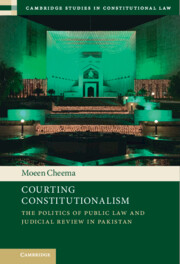Book contents
- Courting Constitutionalism
- Cambridge Studies in Constitutional Law
- Courting Constitutionalism
- Copyright page
- Dedication
- Contents
- Acknowledgements
- Table of Cases
- 1 Introduction
- 2 Postcolonial Legality
- 3 Martial Rule
- 4 Elective Dictatorship
- 5 Praetorian Governmentality
- 6 Indirect Praetorianism
- 7 Military–Civil Composite
- 8 Corporatist Governance
- 9 Conclusion
- Bibliography
- Index
5 - Praetorian Governmentality
Islamisation of Laws and the Genesis of Substantive Constitutionalism
Published online by Cambridge University Press: 16 December 2021
- Courting Constitutionalism
- Cambridge Studies in Constitutional Law
- Courting Constitutionalism
- Copyright page
- Dedication
- Contents
- Acknowledgements
- Table of Cases
- 1 Introduction
- 2 Postcolonial Legality
- 3 Martial Rule
- 4 Elective Dictatorship
- 5 Praetorian Governmentality
- 6 Indirect Praetorianism
- 7 Military–Civil Composite
- 8 Corporatist Governance
- 9 Conclusion
- Bibliography
- Index
Summary
Chapter 5 highlights the emergence of a distinctly praetorian governmentality in the next cycle of military rule in the 1980s. Having displaced an elected government, the military regime of General Zia ul Haq (1977–88) set about the task of refining the blueprint for military rule. What was distinctive, however, about this form of praetorian governmentality as compared to the earlier period of military rule was the hegemonic ideation of political legitimacy predicated on religion. The military regime visibly embarked on the agenda of 'Islamising' the constitution and the laws. New Shariat courts were given unprecedented powers of judicial review of legislation for conformity with Islamic law at the same time that the fundamental rights provisions of the Constitution remained under suspension, and the superior courts’ Writ jurisdiction was incapacitated. Nonetheless, Islamisation also enabled the superior courts to re-orient their public law jurisprudence and to bolster their legitimacy. Pakistan’s appellate courts learnt to capitalise on this new rhetoric and restructured a more assertive form of judicial review grounded in the normative bedrock of Islamic legality.
Keywords
- Type
- Chapter
- Information
- Courting ConstitutionalismThe Politics of Public Law and Judicial Review in Pakistan, pp. 108 - 137Publisher: Cambridge University PressPrint publication year: 2021

